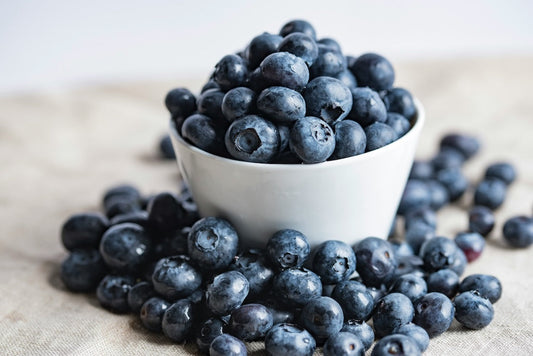A healthy gut flora plays a crucial role in our health. It not only influences our digestion, but also our immune system and our general physical condition. Porridge is not only a delicious breakfast, but also rich in dietary fibre which is beneficial for a healthy gut flora.
In this article, we will take a closer look at the importance of a healthy gut flora, the role of probiotics and the benefits of porridge for intestinal health. We will also provide tips on how to incorporate porridge into your diet and discuss other lifestyle factors that can help to support a healthy gut flora.
Healthy breakfast from Verival – find out more here!
What is porridge?
Porridge is a delicious dish made from oats and liquid. It originated in Scotland but has now gained popularity worldwide. Porridge is not only tasty, but also a valuable food for improving the intestinal flora.
The definition of porridge is simple: it is a mixture of oats and liquid that is cooked until it reaches a creamy consistency. There are countless variations of porridge, which can differ from region to region. Some prefer it sweet, with ingredients such as honey, fruit or nuts, while others prefer it salty, with vegetables or spices. The variety of flavours makes porridge a flexible meal that can be adapted to your individual preferences.
Porridge is not only delicious, but also rich in nutrients. Oats, the main ingredient in porridge, are an excellent source of dietary fibre, proteins and complex carbohydrates. Dietary fibre is particularly important for promoting gut health. It aids good digestion by stimulating intestinal motility and contributes to the formation of short-chain fatty acids that positively influence the intestinal flora.
Using oats as the main ingredient for porridge is an ideal way to improve your gut flora. Oats contain soluble fibre, which can help regulate bowel movements and prevent constipation. They also provide important nutrients such as vitamin B, iron, magnesium and zinc, which can contribute to digestive health.
The importance of a healthy gut flora
The gut flora, also known as microbiota or gut microbiome, consists of a wide range of microorganisms, including bacteria, viruses and fungi, that live in our digestive tract. These microorganisms form a complex community that plays a crucial role in our health.
The gut flora has various important functions in the body. It aids digestion and metabolism by helping to break down nutrients that we take in from our food. It also produces important enzymes and vitamins that our body needs to function optimally.
Gut flora also has a major impact on digestive health. It helps to create a healthy intestinal barrier that prevents harmful bacteria, pathogens and toxins from entering the body. Impaired gut flora can lead to digestive problems such as bloating, diarrhoea, constipation and irritable bowel syndrome.
However, an imbalance in gut flora can also affect the health of the entire body. Studies have shown that an unbalanced intestinal flora can be associated with various diseases, including inflammatory bowel disease, allergic diseases, metabolic disorders such as diabetes and obesity, but also mental illnesses such as depression and anxiety.
A healthy gut flora can even strengthen the immune system. About 70% of our immune system is located in the gut, and the gut flora plays a crucial role in regulating the immune response. A healthy gut flora promotes the production of immune cells and anti-inflammatory substances that can strengthen the immune system and protect against infections.
Vegan breakfast from Verival – discover it here!
Probiotics – prebiotics and the gut
Probiotics are live microorganisms that can have a positive effect on gut flora. They are often found as dietary supplements or in fermented foods such as natural yoghurt, kefir, kimchi, buttermilk or sauerkraut. They include lactic acid bacteria (lactobacilli) and yeasts. These microorganisms can help to restore and maintain the balance of the intestinal flora. Probiotics are often referred to as ‘good bacteria’ because they can help to improve digestion, strengthen the immune system and reduce inflammatory processes in the intestines. Taking probiotics can be a way to promote intestinal health and improve well-being.
Prebiotics are non-digestible fibres in food that serve as food for the good bacterial species in the intestine. The best known include inulin, which occurs for example in chicory, artichokes, legumes or Jerusalem artichoke, and pectin, which can be found in fruits such as bananas and apples. Prebiotics are important because they support intestinal health. They promote the growth of healthy intestinal bacteria and at the same time reduce the proliferation of pathogenic bacteria. They also support the production of vitamin K in the intestines, which is essential for blood clotting. In this way, they maintain the healthy balance of the intestinal flora and ensure good defences. A healthy gut is crucial for the effective digestion of all food components and the absorption of nutrients.
Probiotics and prebiotics are closely related, because prebiotics serve as food for probiotic bacteria and thus support the growth of intestinal flora. For gut health, the two are therefore an unbeatable team.
In the following, however, we will focus particularly on probiotics.
Probiotics and gut health
Probiotics offer a variety of benefits for gut health. By supporting the balance of the intestinal flora, they can help alleviate digestive problems, strengthen the intestinal mucosa and improve the function of the digestive system. Probiotics can help regulate bowel movements, reduce bloating and alleviate the symptoms of irritable bowel syndrome.
In addition, probiotics can have anti-inflammatory effects in the gut. They can help reduce the inflammatory processes associated with certain bowel disorders such as inflammatory bowel disease (such as Crohn's disease or ulcerative colitis). By strengthening the intestinal barrier, probiotics can also help to reduce the risk of intestinal permeability, also known as ‘leaky gut’.
Taking probiotic bacterial cultures can also strengthen the immune system, since a large part of the immune system is located in the gut. By fighting off harmful bacteria, probiotics support the immune system and protect against infections.
It is important to note that not all probiotics are the same. Different strains of probiotic bacteria can have different effects. Therefore, it is advisable to select high-quality probiotics that are based on scientific evidence and contain a sufficient number of live cultures.
Taking probiotics can be an effective strategy to promote gut health and improve well-being. However, it is important to be aware that probiotics should not be considered a substitute for a healthy diet and an overall healthy lifestyle.
How probiotics support the gut
Probiotics have various mechanisms by which they can support the gut. One of the main mechanisms is that they can balance the gut flora and restore the balance between good and bad bacteria. By colonising the gut, they compete with harmful bacteria for nutrients and living space, which helps to contain the growth of harmful bacteria.
Another mechanism is that probiotics can help strengthen the intestinal barrier. They can promote the production of mucus, which serves as a protective layer for the intestinal wall and prevents harmful substances from entering. In addition, probiotics can strengthen the tight junctions that connect the cells of the intestinal wall, thus reducing permeability.
The benefits of porridge for the intestinal flora
Porridge is a high-fibre meal that offers a variety of benefits for the intestinal flora. Fibre is an indigestible carbohydrate that is abundant in plant-based foods such as oats. It serves as food for the good bacteria in our intestines and is therefore crucial for a healthy intestinal flora.
Dietary fibre supports gut health by promoting digestion and regulating stool consistency. It increases stool volume and facilitates bowel movements, thus preventing constipation. In addition, dietary fibre helps to maintain a healthy environment in the gut by stabilising the pH and promoting the growth of good bacteria.
Studies have shown that eating high-fibre foods such as porridge has a positive effect on the intestinal flora. One study showed that regular consumption of oat fibre, which is found in porridge, led to an increase in bifidobacteria, which are considered an important group of probiotic bacteria.
Porridge is an excellent choice for promoting intestinal flora because it is a rich source of dietary fibre. The oats used as the main ingredient in porridge contain soluble fibres such as beta-glucan, which have a high water-binding capacity and support healthy digestion.
In addition to fibre, porridge also contains other nutrients that can contribute to gut health. For example, oats are rich in antioxidants such as vitamin E, which help to reduce inflammation in the gut. They also contain important minerals such as zinc and magnesium, which are important for optimal gut function.
Porridge recipes to improve gut flora
And because it can be extremely difficult to find the right inspiration for breakfast in the morning, we have summarised our best recipes for you here. Whether you are looking for sugar-free, vegan or prebiotic options, there is something for everyone. Starting the day healthy gives you enough energy to get through the day with flying colours!
Basic porridge recipe – sugar-free and vegan
Scottish oatmeal is quick and easy to prepare. You only need three ingredients for the basic recipe, and then you can add your favourite fruits and spices.
Preparation time 10 mins.
Course: breakfast
Servings: 1
Ingredients
- 180 ml milk or plant-based drink
- 3-4 tbsp oats
- 1 pinch of salt
Preparation
- Bring the milk (or plant-based drink) to the boil in a pan.
- Add the oats and turn the heat down to low.
- Simmer for about 5 minutes (stirring constantly with a wooden spoon to prevent the milk from burning and to give the porridge a nice creamy texture).
- Remove the pot from the stove and let the porridge steep until it reaches the right consistency.
- Finally, add a pinch of salt. This will bring out the flavour of the oats even more, whether you like your porridge with sweet or savoury toppings.
Tips for incorporating porridge into your diet
Porridge can be integrated into your diet in a number of ways. One option is to plan meals in advance and include porridge as a healthy option for breakfast. You can also enjoy porridge as a snack or main meal by adding the toppings of your choice. Whether it's fresh fruit or nuts and seeds, porridge is so versatile and delicious.
Another recommendation is to combine porridge with other gut-friendly foods such as berries, chia seeds or nuts, which provide additional fibre and nutrients. This further promotes gut health and helps to achieve a balanced diet. Porridge is a flexible and versatile option for incorporating the benefits for the intestinal flora into your daily diet.
Fancy some porridge? Discover the variety of Verival porridges here.
Lifestyle factors to support healthy gut flora
Healthy gut flora is not only influenced by nutrition but also by certain lifestyle factors. Here are some important aspects to support healthy gut flora:
Exercise and physical activity play a significant role in gut health. Regular exercise promotes blood flow to the digestive system and supports healthy intestinal motility. Studies have shown that active people have a greater diversity of gut bacteria, which is associated with better gut health.
Reducing stress is also important, as chronic stress can have negative effects on gut flora. Stress can cause inflammation in the gut and disrupt the balance of gut bacteria. Relaxation techniques such as meditation, yoga or taking regular breaks can help to reduce stress and support gut health.
Adequate fluid intake is crucial for good bowel function. Water helps to soften stools and facilitate digestion. Drinking enough water every day is recommended for optimal gut health.
A good night's sleep is also important for healthy gut flora. Sleep regulates intestinal movements and enables efficient digestion. Lack of sleep can lead to intestinal flora disorders and impair intestinal health. It is therefore advisable to ensure a regular sleep routine and get enough sleep to support intestinal flora.
By prioritising exercise, stress reduction, hydration and a good night's sleep, you can help to promote healthy gut flora and support overall gut health. These lifestyle factors complement proper nutrition and contribute to a holistic approach to gut health.
Conclusion: gut flora and porridge for gut health
Porridge is a wonderful choice for improving gut flora and promoting overall gut health. The high fibre content of porridge, especially when made with oats, helps to create a healthy intestinal environment and promotes the growth of good bacteria. Eating porridge regularly can alleviate digestive discomfort and reduce the risk of various intestinal diseases.
To incorporate porridge into your diet, it is recommended to plan meals in advance and include porridge as a healthy breakfast option. It can also be served as a snack or main meal, with various toppings and ingredients used to increase variety and flavour. Combining porridge with gut-friendly foods such as berries, chia seeds or nuts enhances the positive effects on gut flora.
However, it is important to emphasise that a healthy gut flora cannot be achieved by eating porridge alone. A balanced and varied diet, rich in fruit, vegetables, whole grains and fermented foods, plays a crucial role in maintaining a healthy gut flora. Additionally, lifestyle factors such as exercise, stress reduction, adequate hydration and a good night's sleep should also be considered to optimally support gut health.
Overall, porridge can make a valuable contribution to improving gut flora as part of a balanced diet and a healthy lifestyle. By eating a healthy diet and living a healthy lifestyle, you can promote gut health and improve your overall well-being.
Frequently asked questions
What is the difference between oats and porridge?
The difference between oats and porridge is that oats are the base ingredient, while porridge is the cooked dish made from oats and liquid. Oats are the unprocessed, flat flakes of oat grains, while porridge is a warm and creamy mixture of cooked oats. Oats can be used in a variety of ways, while porridge specifically refers to the preparation of a warm oat dish.
How often should you eat porridge to improve your gut flora?
The frequency of porridge consumption to optimally promote the composition of the intestinal flora depends on individual needs. It is recommended to eat porridge regularly as part of a balanced diet that also includes other high-fibre foods. There is no set number; it is important to pay attention to individual nutritional needs and to maintain a varied diet.
Can porridge be eaten in the evening?
Yes, porridge can also be eaten in the evening. It is a nutritious meal that is a good source of complex carbohydrates and fibre. The slow digestion of porridge can help to keep blood sugar levels stable and provide a lasting feeling of satiety, which can be particularly beneficial in the evening.
Can an imbalance in the intestinal flora recover by itself?
Yes, an imbalance in the intestinal flora – known as dysbiosis – can recover by itself in many cases. The gut has an amazing ability to heal itself and restore the intestinal flora. After an imbalance, such as that caused by taking antibiotics, an unbalanced diet or stress, it may take some time for the intestinal flora to return to normal. A healthy diet, rich in fibre-rich foods, as well as probiotic foods and good general health, can help the intestinal flora to recover.
Which foods are good for building intestinal flora?
Foods that are good for the intestinal flora include high-fibre foods such as wholemeal products, vegetables and fruit. Probiotic foods such as yoghurt (it contains the valuable lactobacillus) and other fermented milk products (such as buttermilk) and foods (e.g. sauerkraut). Likewise, prebiotic foods such as garlic and onions. Foods rich in omega-3, such as oily fish, and anti-inflammatory spices such as ginger and turmeric can also promote gut health. A balanced diet with a combination of these foods supports the human gut and thus strengthens a healthy person in their entirety.
How long does it take for gut flora to recover?
The recovery time of gut flora can vary, but it can take anywhere from a few weeks to several months. A healthy diet, exercise, adequate sleep and stress reduction support recovery. Probiotics can also help. If the issue persists, a doctor or nutrition expert should be consulted.
Is porridge good for digestion?
Yes, porridge is good for digestion due to its high fibre content and easy digestibility. Fibre promotes healthy bowel function and aids digestion.
How healthy is fibre?
Fibre is extremely healthy for the body and offers many benefits. It promotes healthy digestion, aids weight management and reduces the risk of heart disease and cancer. It also supports a healthy intestinal flora.
What is a colon cleanse?
A colon cleanse may be necessary to improve an unbalanced intestinal flora. In many cases, a disturbed intestinal flora can regenerate itself. However, it is often useful to support this process with nutrition or the intake of selected microbiological preparations (probiotics/prebiotics). Especially after a long period of taking antibiotics and when there are complaints regarding digestion and other areas as a result, a bowel cleanse is important to support the beneficial bacteria in the gastrointestinal tract!
























